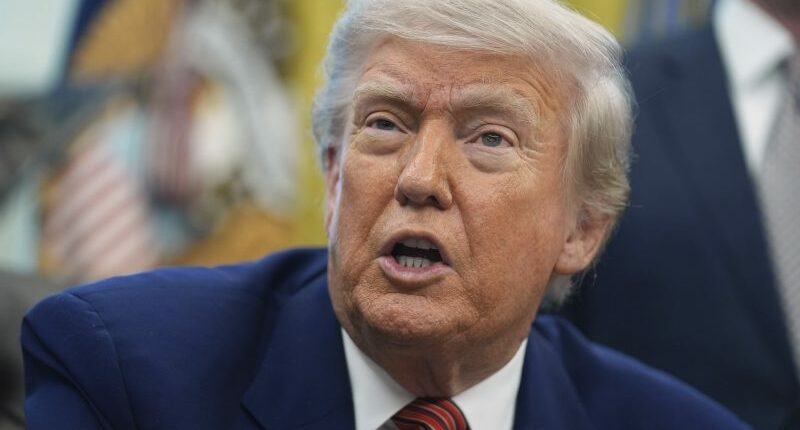Share this @internewscast.com

President Donald Trump’s recent suggestion to utilize tariff revenue to provide Americans with payments of “at least” $2,000 is encountering both legal hurdles and skepticism, particularly from conservative circles.
Throughout his presidency, Trump has intermittently proposed distributing dividends to citizens. However, his latest announcement arrives amid growing public dissatisfaction with rising costs and a looming Supreme Court case that could significantly impact his extensive reliance on tariffs.
Kevin Hassett, who leads the White House National Economic Council, highlighted that any such dividend payments would require congressional approval. He also criticized the Biden administration’s management of inflation, suggesting that consumer purchasing power has diminished.
“We still have progress to make, but we’re catching up fast. People are currently about $2,000 behind where their purchasing power stood when Joe Biden assumed office,” Hassett mentioned during a Fox News interview on Monday.
Hassett further explained, “We recognize that affordability is a concern for many, but we’re narrowing the gap swiftly. These policies, along with potential rebate checks, could help us close the gap entirely at an accelerated pace.”
Recent polling conducted by ABC News, The Washington Post, and Ipsos reveals that 65 percent of Americans disapprove of Trump’s tariff strategies, with 72 percent of independents sharing this sentiment. Additionally, exit polls from the recent elections in New Jersey and Virginia indicate that affordability remains a primary concern for voters.
“Mr. Trump is trying to dull the public’s tariff pain with direct payments that he can take credit for. This is a new version of the age-old income redistribution game of taxing people too much but then trying to appease them with tax credits or one-time cash payments,” The Wall Street Journal editorial board wrote Monday in a piece criticizing Trump’s “contradictions” on tariffs.
Trump on Sunday posted on Truth Social a defense of tariffs, which included a pledge that a “dividend of at least $2000 a person (not including high income people!) will be paid to everyone.”
The president on Monday doubled down on the idea, posting on social media that money left over from the $2,000 payment to “low and middle income USA citizens” would be used to pay down the national debt, which sits at more than $38 trillion.
But details of how the checks would work remained sparse.
Treasury Secretary Scott Bessent said on ABC’s “This Week” that he had not spoken with Trump about the idea, and he suggested the dividend could manifest “in lots of forms and lots of ways,” including helping to pay for tax cuts signed into law earlier this year.
A White House official said in a statement that the administration “is committed to putting this money to good use for the American people.”
“President Trump’s tariffs are resetting global commerce, securing manufacturing investments, and safeguarding our national and economic security – and they’re also raising billions in revenue for the federal government,” the official said.
The timing of Trump’s pitch coincides with a key Supreme Court case in which the justices are hearing a challenge to Trump’s use of emergency powers to impose sweeping tariffs on dozens of other countries.
Trump has spent weeks warning that if the case went against him and the tariffs were undone, it could cause economic calamity. He has aggressively used tariffs to pressure companies to invest in the U.S. and to broker trade deals with other countries.
The Trump administration has acknowledged that a Supreme Court loss would mean refunds of the billions in tariff revenue already collected, and it would upend the cornerstone of the president’s trade policy.
Trump’s repeated talk of using tariff revenue to pay Americans and pay down the debt runs counter to what his own government lawyers told the Supreme Court last week, which is that it was “only incidental” that the tariffs raised revenue.
“These are regulatory tariffs,” Solicitor General John Sauer told the court.
Economists have also pointed out that Trump’s proposal faces a math problem.
Erica York, vice president of federal tax policy at the non-partisan Tax Foundation, noted on X that a baseline cost for Trump’s proposed dividends for all adults making less than $100,000 would total nearly $300 billion.
“Only problem, new tariffs have raised $120 billion so far,” York said.
“The math gets worse accounting for the full budgetary impact of tariffs: a dollar of tariff revenue offsets about 24 cents of income and payroll tax revenue,” York wrote. “Adjusting for that, tariffs have raised $90 billion of net revenues compared to Trump’s proposed $300 billion rebate.”
One of the questions about the potential payout would be how much it would cost. If the dividend is distributed to all low and middle-class households, that would entail 81 percent of the U.S. population, according to a Pew Research study that was published in May last year. Just over half of Americans, 51 percent, fell into the middle-income category, while 30 percent were in the lower-income tier, according to the analysis.
If the dividends are designated like the pandemic-era stimulus checks, a $2,000 dividend would cost about $600 billion, according to the Committee for a Responsible Federal Budget, a fiscal-policy non-profit.
The group said if the Supreme Court upholds the lower courts’ rulings, the income from the president’s tariffs “would be sufficient to pay $2,000 dividends after seven years.”
Trump has floated the idea several times, including in early October and over the summer.
“We have so much money coming in, we’re thinking about a little rebate,” Trump told reporters outside the White House in July.
“A little rebate for people of a certain income level might be very nice,” he added.
The president earlier in the year also mused about using savings from the Department of Government Efficiency’s (DOGE) cost-cutting efforts in slashing the size of the federal government to directly pay Americans. The idea failed to gain traction, though, as Republicans argued those savings should go toward reducing the debt.
Hassett said Monday the idea was “back on the table to think about what to do with those tariff revenues.”
“I’m sure the president will discuss with congressional leaders whether, because of all of the extra tax revenue, there isn’t more room to get checks back to people,” he said.











